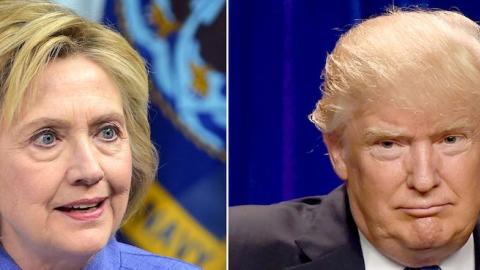We are about to prove that two negatives make a positive. According to most polls, almost 60 percent of voters dislike or hate Hillary Clinton, while a bit more than that dislike or hate Donald Trump. One out of every three voters who plan to vote for either Trump or Clinton say they are doing so out of dislike for the other candidate. Yet, these negatives notwithstanding, one candidate will achieve a positive result: a four-year lease on the White House after voters make their decision.
Trump, backed by an army of the dispossessed, and by right-leaning voters who feel betrayed by the Republican establishment, won the nomination with what can only be called a hostile takeover of the Republican party. Clinton won the chance to lead her party thanks to a chameleon-like willingness to abandon support for her husband’s centrist policies on taxation, trade, incarceration, and welfare reform: she followed her party to the left because she is its leader. The campaign will be unedifying: both candidates believe that the path to victory will involve a slog through mud. They each plan to accentuate the negative, emphasising the reasons for the other's unpopularity. Trump calls Clinton a "crook", Clinton retorts that Trump is "temperamentally unfit to be president", and could trigger a nuclear war if some foreign leader "gets under his very thin skin".
The voters might not be able to find a candidate they really like, but they should be able to find one whose views they find acceptable. If you believe America should develop all of its domestic energy resources, and not take seriously the threat of carbon emissions, Trump is your man. If you want more coal mines closed, and fracking made more difficult, Clinton is your person. If you think the Keystone XL pipeline that would have brought more Canadian oil to America should finally be built, go with Trump; if you oppose its construction, be relieved that Clinton has seen the error of her ways when, as Secretary of State, she smiled with favour on a project she now opposes. If you want to see the Paris deal aimed at lowering emissions implemented, backed by a large income transfer to the developing world, pull the lever for Clinton. If you want the deal scuppered by the next president, which can be done since it never received senate approval and therefore is not a treaty, go with Trump.
If you want to bar Muslim immigrants until we can set in place an effective vetting process, it's The Donald for you. If you want to welcome the first tens of thousands, count on Clinton to stand with Obama in granting permission to enter. If you want a wall, concrete or metaphorical, on our Mexican border, its Trump; if you are concerned more about humane care for the new incoming wave of illegal immigrants than for finding ways to keep them out, it's Hillary.
Perhaps the greatest difference between the candidates is to be found by studying their taxation proposals. As part of his plan for tax reform, Trump would cut the current corporate tax rate from 35 percent to 15 percent, below the 28 percent that President Obama supports as part of a broader reform. Clinton has not proposed any reduction in the corporate rate, the highest in the industrial world and well above the industrialised country average of 24.1 percent, preferring instead to use the funds from the existing high rate for targeted tax credits for apprenticeships and employee profit-sharing. She would prevent corporate flight by relying on stiff Treasury rules that have already killed several mergers that would have resulted in corporate removals to foreign countries with more favourable tax regimes such as Ireland, so-called inversions, Pfizer's planned acquisition of Botox-maker Allergan being the most notable. Trump would deter such flight by levying swingeing tariffs on goods manufactured in overseas runaway factories.
It is almost impossible to compare what the candidates have in mind for individual taxpayers. Clinton is clear—high earners must pay more. She favours a 4 percent surtax on incomes over $5 million, and an increase in tax rates on capital gains from assets held for less than six years, and on estates larger than $3.5 million. Trump would end the estate tax, cut the top marginal rate from 39.5 percent to 25 percent, and eliminate income taxes on families with annual earnings of $50,000 or less. Unless he won't. His plan called for tax relief for the wealthiest tax payers (Friday), increasing taxes on them (Monday), then lowering their rates (Thursday), final decision to be made in negotiations with congress. All in all, Clinton is tax-and-spend, Trump is cut taxes and spend anyway, adding $10 trillion to the $20 trillion national debt over the next decade according to the nonpartisan Tax Foundation.
There are some areas of agreement.
* Neither candidate would reduce social security benefits, in Trump's case ignoring the plans of the Republican House of Representatives to do just that.
* Neither candidate supports President Obama's Trans-Pacific Partnership (TPP), although Trump's opposition seems to be unequivocal, at least until he becomes negotiator-in-chief to replace the "incompetents" who drafted the existing agreement. Clinton hints that she is now opposed to what she once called "the gold standard of trade agreements", but might reverse her reversal of position if major changes are made in the existing document to placated the trade unions and the greens.
* Neither candidate supports the Iraq war, Trump claiming he always did, with supporting evidence hard to come by, and Clinton admitting—under pressure from Bernie Sanders—that her initial support was a mistake.
* Both are firm supporters of Israel, which puts Clinton on a collision course with Sanders' representatives on the 15-member committee that starts work this week on drafting the Democrats' platform. Sanders' appointees favour boycotting Israel and a variety of pro-Palestinian causes.
Clinton and Trump agree that the nation's infrastructure needs refreshing, with Clinton wanting to finance construction by increasing some taxes and Trump, it seems, by increasing the deficit while denouncing the national debt as one of the gravest threats to our future.
* Trump, who wants to "make America great again", the operative word being "again", believes the years of the Obama administration have been an economic disaster for workers and the middle class; Clinton, in this case an unguarded and off-message soon-to-be First Gentleman, agrees.
The prospect of a Trump presidency has failed to rattle financial markets, and not because Trump is certain to lose. Clinton's lead in the polls is neither significant nor insurmountable, nor one she can easily increase without the help of an accident-prone Trump. The Donald has spent the last few weeks in a suicidal, racist attack on an American-born judge presiding in a private law suit alleging fraudulent practices by something called Trump University. The pitter patter of the feet of former supporters scurrying for the exits reverberates in the land. There remains one wild card: the possibility, increasingly remote, that the heads of the FBI and the Department of Justice will be willing to embarrass their boss, who has declared Hillary Clinton fit to occupy the Oval Office, by indicting her for any one or several of the crimes her critics contend she has committed.
















